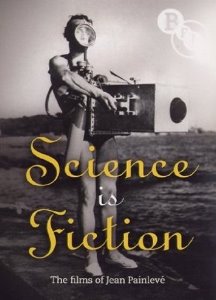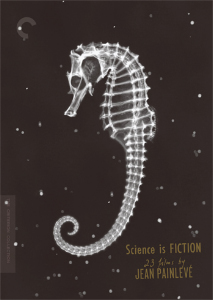![]()
![]()

![]()
![]()
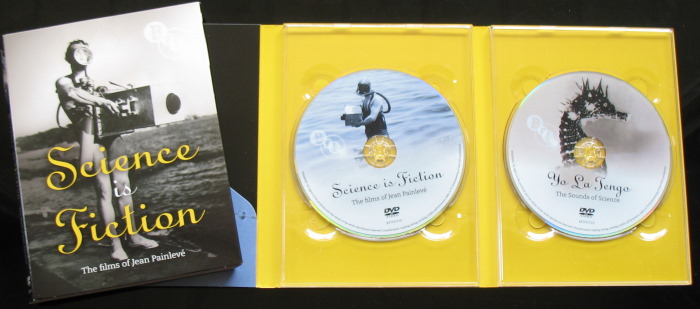
(BFI TOP , Criterion BOTTOM)
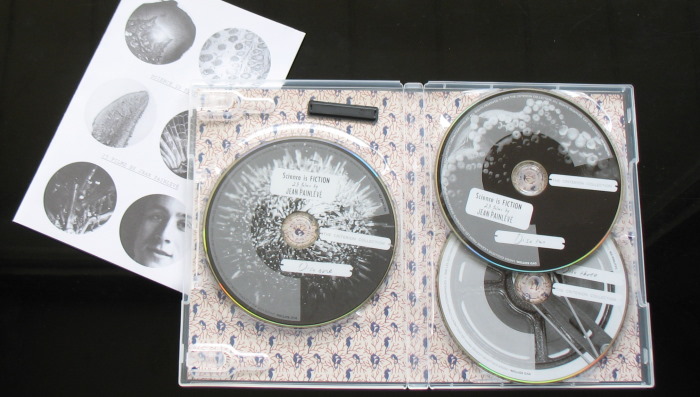
(aka 'Science Is Fiction/The Sounds Of Science' or 'Science Is Fiction: 23 Films by Jean Painlevé' )
Directed by Jean Painlevé
France 19
|
BFI description from their website
HERE: Before David Attenborough and Jacques Cousteau - there was
Jean Painlevé. Poetic pioneer of science films, Painlevé explored a twilight
realm of vampire bats, seahorses, octopi, and liquid crystals. In collaboration
with his life-partner, Genevieve Hamon, Painlevé made more than 200 science and
nature films and was an early champion of the genre. This selection from 50
years of passionate scientific enquiry includes his most famous films - The
Sea Horse, The Vampire, The Love Life of the Octopus and
Sea Urchins - with their often-amazing music, which ranges from Duke
Ellington to the French pioneer of electronic music, Pierre Henry. *** Criterion description from their website HERE: The mesmerizing, utterly unclassifiable science films of Jean Painlevé (1902-89) have to be seen to be believed: delightful, surrealist-influenced dream works that are also serious science. The French filmmaker-scientist-inventor had a decades-spanning career in which he created hundreds of short films on subjects ranging from astronomy to pigeons to, most famously, such marine-life marvels as the sea horse and the sea urchin. This definitive three-disc collection brings together the best of these, and also includes the French television series Jean Painlevé Through His Films, rock band Yo La Tengo’s eight-film score The Sounds of Science, and an essay by film scholar Scott MacDonald. *** Jean Painlevé was a film director, critic, theorist, and animator, yet his interests and studies also extended to mathematics, medicine, and zoology. Amazingly, all these disparate strands came together in a groundbreaking, decades-spanning artistic career. Operating under the credo: Science is fiction, Painlevé forged his own unique cinematic path, creating countless short films for both the viewing public and the scientific community. Moreover, he was also one of the first filmmakers to take his camera underwater. Surreal, otherworldly documents of marine life, these films transformed sea horses, octopi, and mollusks into delicate dancers in their own floating ballets. This anthology features twenty-three of Painlevé's shorts in their original form, as well as Yo La Tengo's ninety-minute original score The Sounds of Science, written in 2001 to accompany eight of the director's films. |
DVD Comparison:
BFI (2-disc) - Region 2 - PAL vs. Criterion (3-disc) - Region 1 - NTSC
(BFI - Region 2 - PAL LEFT vs. Criterion - Region 1 - NTSC RIGHT)
| DVD Box Cover |
|
|
| Distribution | BFI - Region 2 - PAL |
Criterion - Spine # 468 Region 1 - NTSC |
| Video |
1.33:1.00 Aspect Ratio Bit-rate:
5.55 Mbps |
1.33:1.00 Aspect Ratio Bit-rate:
5.58 Mbps |
|
NOTE: The Vertical axis represents the bits transferred per second. The Horizontal is the time in minutes |
||
|
Bit-rate: BFI Disc 1
|
 |
|
|
Bit-rate: BFI Disc 2 |
 |
|
|
Bit-rate: Criterion 1 |
 |
|
|
Bit-rate: Criterion 2 |
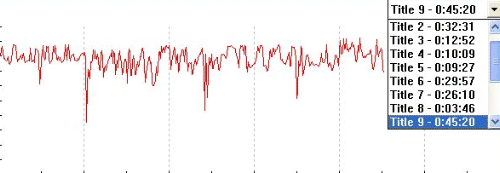 |
|
|
Bit-rate: Criterion 3 |
 |
|
| Audio | French narration + "The Sounds of Science" score by Yo La Tengo | French narration + "The Sounds of Science" score by Yo La Tengo |
| Subtitles | English, None | English, None |
| Features |
Release Information: Studio: BFI Aspect Ratio: 1.33:1 Featurettes: • Filmed introduction by academic Dr Michael Abecassis 'Painlevé the Magician' (18:09 with optional subtitles)• Two short films by Percy Smith: The Birth of a Flower (1910) - 7:37, The Strength and Agility of Insects (1911) - 4:04 • A short film by Adrian Klein: Colour on the Thames (1935) - 6:55 • Also included is a 32-page illustrated booklet with essays and film notes
DVD Release Date: May 28th, 2007 |
Release Information: Studio: Criterion Aspect Ratio: 1.33:1 Featurettes:
DVD Release Date: April 21st, 2009 |
| Comments: |
Firstly, both companies should be roundly commended - this certainly isn't a release that will rival The Dark Knight in product sales numbers. And both BFI and Criterion are fully aware of that. Some obvious effort went into both these packages and their diligence and loving work is easily recognizable. BFI beat Criterion to the punch - by almost a full 2 years with their 2-disc edition of Painlevé films also aptly titled 'Science is Fiction'. While it duplicates much of the content (but not all) - it also has it's own supplements. In regards to the first disc of feature shorts - Criterion adds 'Freshwater Assassins' (23:50), 'Sea Ballerinas' (12:41), 'Diatoms' (17:14) and 'Pigeons in the Square' (27:03). Criterion doesn't seem to have Methuselah from 1927 (running about 9-minutes) while the BFI does. On their first disc the BFI includes the 13-minute animated Blue Beard (Barbe Bleue - 1935 -38) while Criterion have put that on their second disc under 'Animation'. Differences exist in the two packages beyond the above mentioned content and simply one being 2-disc (1 dual - 1 single layered) and the other being 3 (each being dual-layered). Image-wise the Criterion seems to have gone through some more advanced digital cleaning. The damage marks are often less in intensity and there is even more information in the frame (often on all 4 edges.) There are also instances where the Criterion damage is more prevalent (see last capture.) We should note that the Criterion is NOT pictureboxed (see our full description of 'pictureboxing' in our Kind Hearts and Coronets review) as many of their other full-frame releases seem to be transferred. By the way, this is contrary to the listing in the enclosed booklet. While I'll give Criterion an edge in visual appearance - in accordance with source age - I don't find it a deal-breaker. Purchasers should expect quality similar to the screen captures below - there are light damage marks, speckles, flickering contrast and other similar anomalies of varying degrees to contend with. Nothing of that nature hindered by enjoyment.
Subtitles display some differences in translation in both
narration and, original, intertitles (see sample below.) While I'm
unsure of the exactness of either - both generally report the same
information. Each edition has original French dialogue and both offer "The
Sounds of Science" score by Yo La Tengo covering 8 shorts but the
BFI is on it's own separate 2nd, single-layered, disc. The original
audio is of similar weaker quality to the films but is not fatal to
viewing enjoyment. If I wasn't reviewing - I wouldn't have even noticed.
The BFI offer in their extras a very interesting 18-minute introduction by academic Dr. Michael Abecassis entitled 'Painlevé the Magician'. It is a solid, and thorough, introduction. The dialogue is English and has optional subtitles although his accent is not particularly heavy. There are also two short films by Percy Smith: The Birth of a Flower - from 1910 running 7.5 minutes and The Strength and Agility of Insects from 1911 lasting only 4-minutes. Included is another short, 7-minutes long, from Adrian Klein called Colour on the Thames - made in 1935. BFI have some wonderful liner notes in the form of a 32-page illustrated booklet with essays and film notes. In there rendering of The Sounds of Science, Criterion include an interview with band members Georgia Hubley, Ira Kaplan, and James McNew lasting about 10-minutes. On the second Criterion disc there are four sub-sections with segments accessible in a 'Play All' fashion - Early Popular Silent Films, (The Octopus, Sea Urchins and Daphnia - 32:31 in total), Silent Research Films (The Stickleback’s Egg - 26:10 and Experimental Treatment of a Hemorrhage in a Dog - 3:46,) Films for le Palais de la Découverte - namely The Fourth Dimension, The Struggle for Survival, Voyage to the Sky, and Similarities Between Length and Speed.(45:23 in total.) The last section is 'Animation' (as mentioned above.) The third disc has interviews with the filmmaker, drawn from the eight-part television series entitled Jean Painlevé Through His Films, running a lengthy 2 hours 48 minutes and directed by Denis Derrien and Hélène Hazera. It is in French with optional English subtitles. Finally Criterion include a 26-page booklet featuring photos and a new essay by film scholar Scott MacDonald. With the devalued British Pound the BFI offers great value being almost $14 cheaper than the super-stacked Criterion which, despite the savings, is the route we recommend. I honestly enjoyed both editions but the Criterion really packs a wallop with their supplements and further content. Whichever way one leans - we encourage exploration of Painlevé films - they really do have a coolness and charismatic edge to them that is surprising and excessively comfortable. You may be shocked at how much you like them! |
DVD Menus
(BFI - Region 2 - PAL LEFT vs. Criterion - Region 1 - NTSC RIGHT)
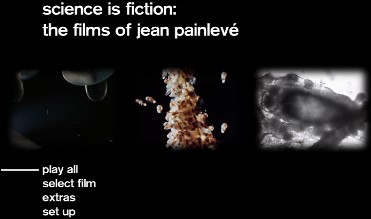 |
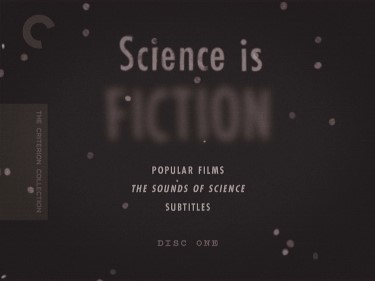 |
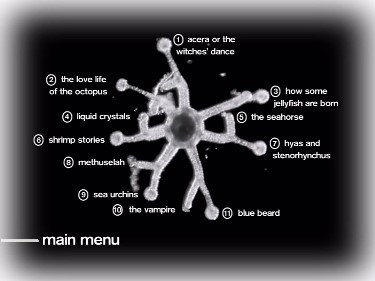 |
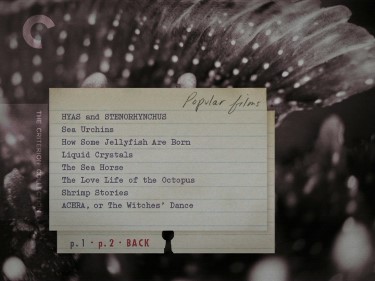 |
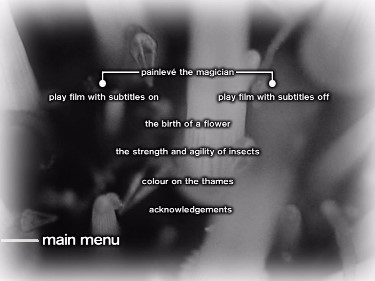 |
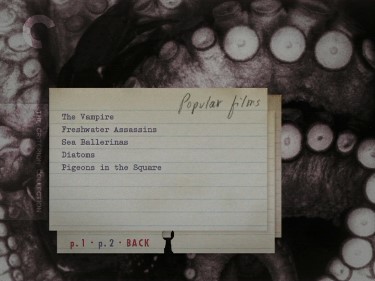 |
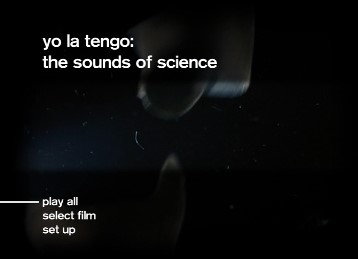 |
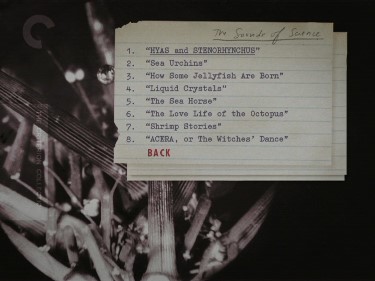 |
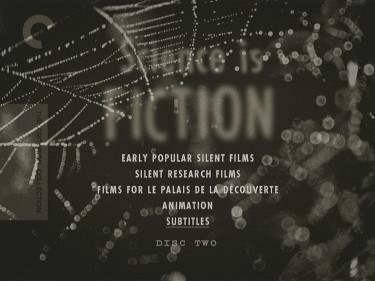 |
|
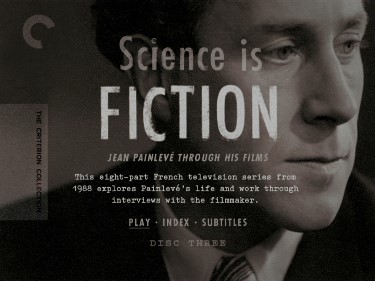 |
Extras
(BFI - Region 2 - PAL LEFT vs. Criterion - Region 1 - NTSC RIGHT)
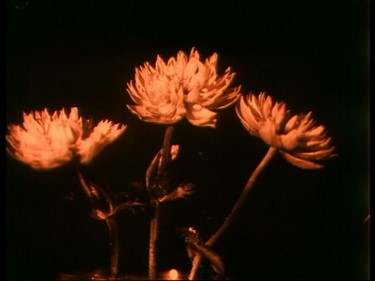 |
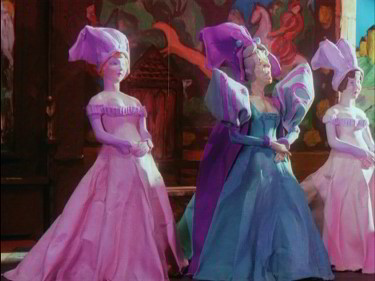 |
Screen Captures
Intertitles
(BFI - Region 2 - PAL TOP vs. Criterion - Region 1 - NTSC BOTTOM)
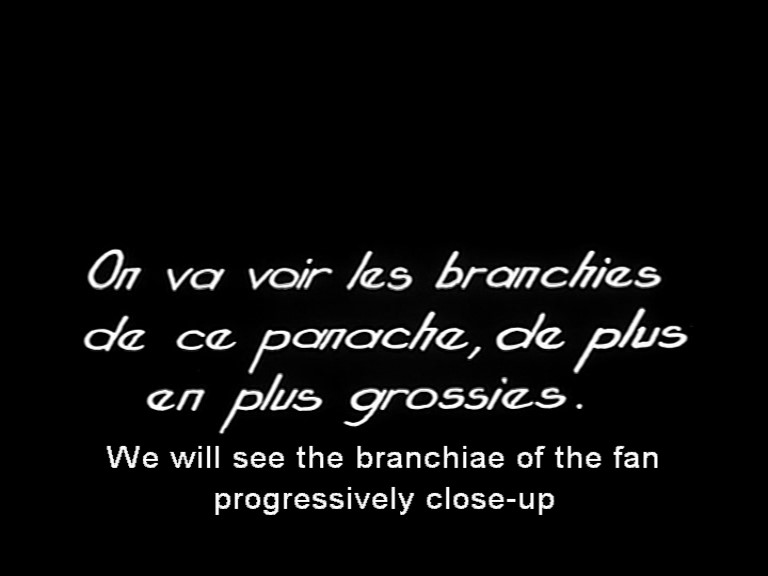 |
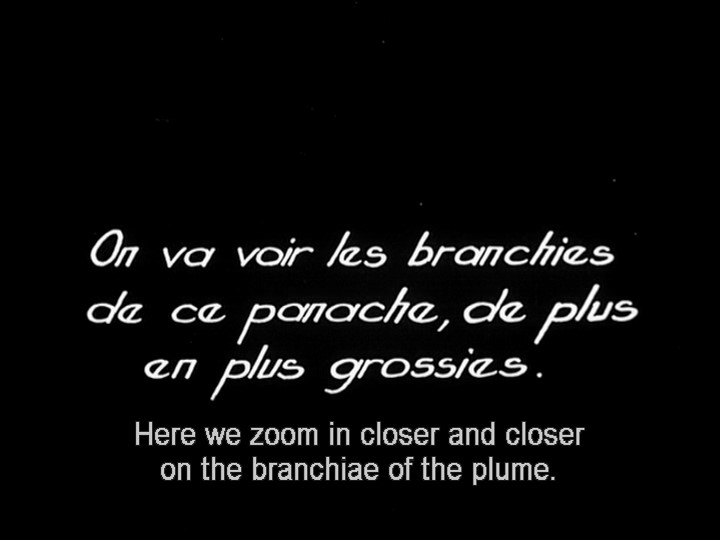 |
(BFI - Region 2 - PAL TOP vs. Criterion - Region 1 - NTSC BOTTOM)
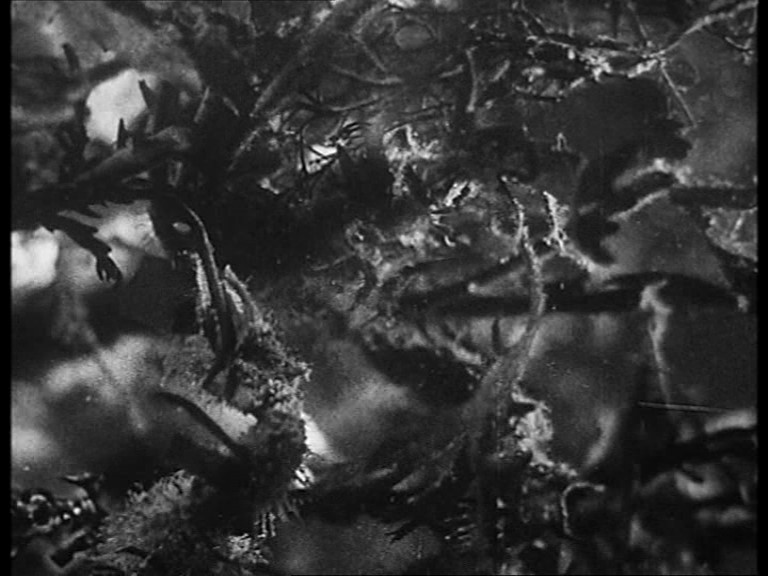 |
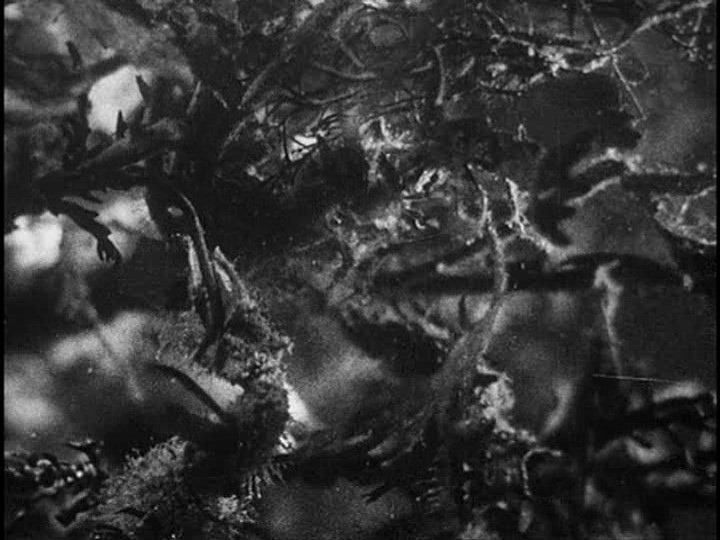 |
(BFI - Region 2 - PAL TOP vs. Criterion - Region 1 - NTSC BOTTOM)
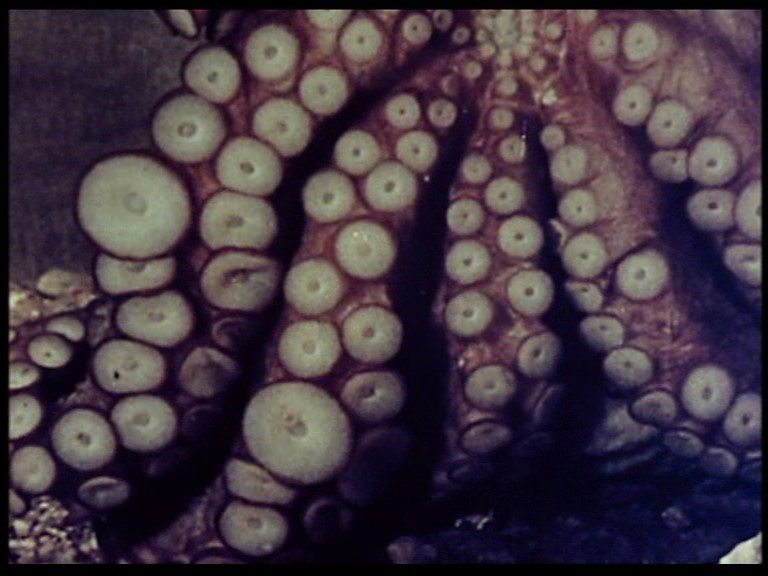 |
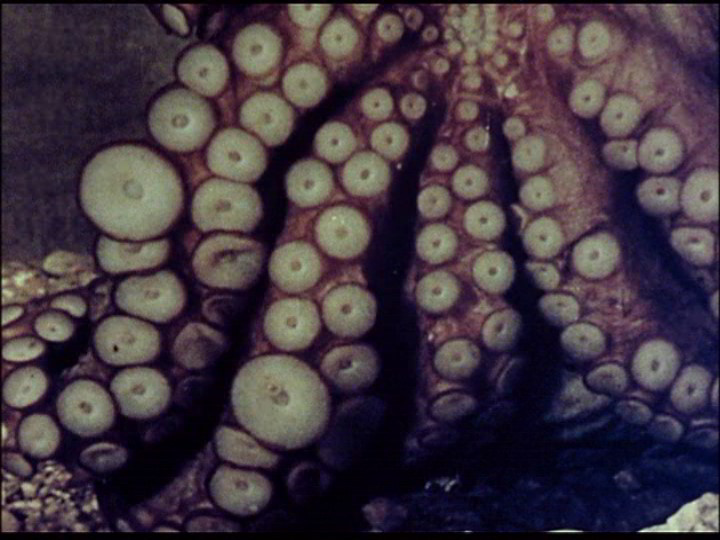 |
(BFI - Region 2 - PAL TOP vs. Criterion - Region 1 - NTSC BOTTOM)
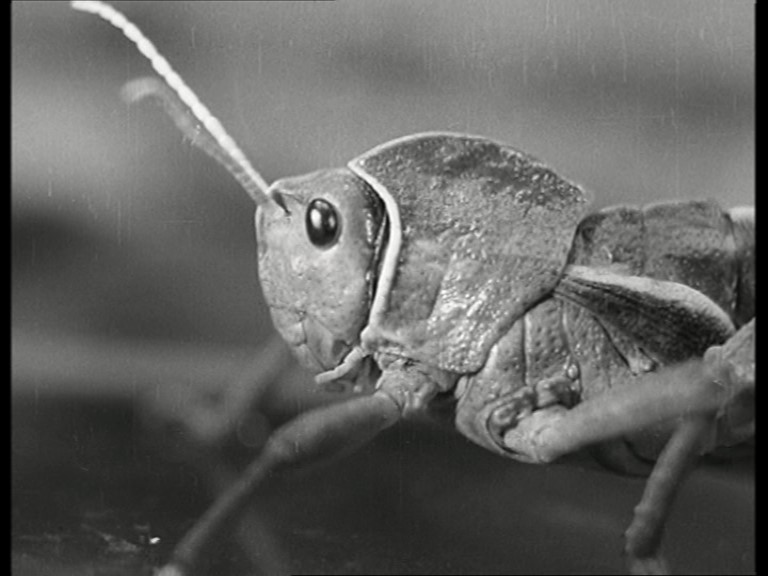 |
 |
(BFI - Region 2 - PAL TOP vs. Criterion - Region 1 - NTSC BOTTOM)
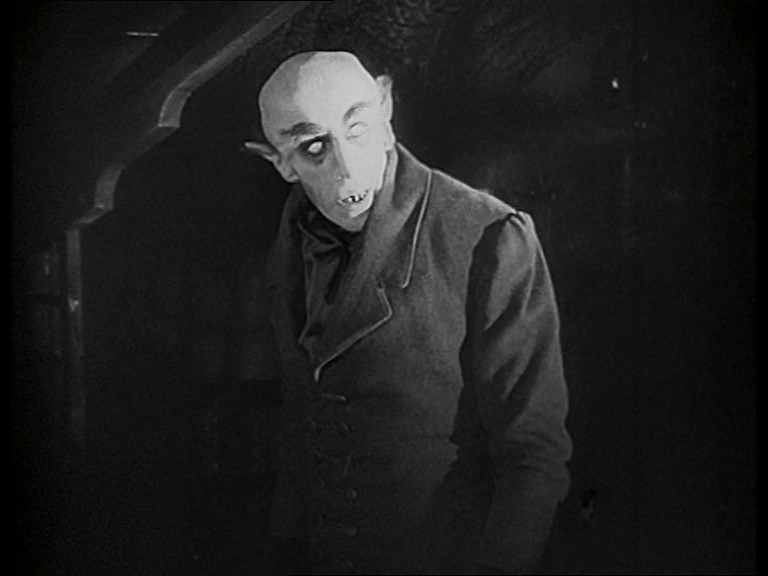 |
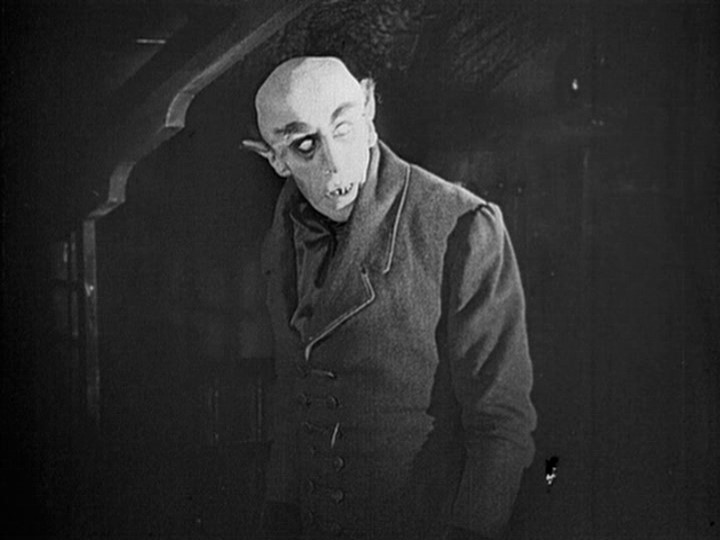 |
